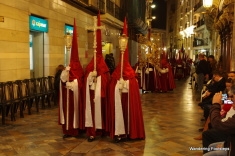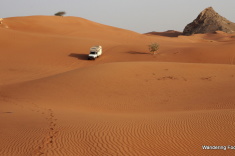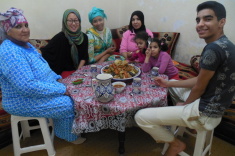November 28th was a special day for Bruno and I, for it marked our first wedding anniversary. To celebrate, we started the day on the misty mountain tops of Djibouti, shimmied down a rocky track to ocean-side palm oases, lunched on the beach with sharks feeding nearby, and drove through volcanic rock to a turquoise salt lake that also happens to be the lowest point on the African continent.
Wait a minute, I think I’m getting ahead of myself here. I better back up a bit.
Everyone travels for different reasons, and for Bruno, it has always been for animals. An encounter with an Ethiopian wolf or the chance to come up close to gorillas in the forests of central Africa will lead to lengthy detours on 4×4 roads. The opportunity to work in chimpanzee rehabilitation or to spot a white oryx in the desert of Saudi Arabia is what drives Bruno forth – literally – year after year.
It was whale shark season in Djibouti. From November until January, these largest of fish (up to 12 meters long!) journey into Djibouti’s Gulf of Tadjoura to feed on plankton and schools of krill. And, since whale sharks are docile, tolerant creatures, it is possible to get up close to them. Djibouti is one of the most reliable places in the world to snorkel with whale sharks.
This is what inspired Bruno to take a 600km detour east, on a terrible road in the middle of waterless rocky mountains.
The fact that Djibouti would be a new country for him – the first in several years – inspired me to name the entire trip a first wedding anniversary celebration. Thanks to wedding gifts from Louise, Lisa and David, Linda and Nevon, and Nancy and Paul, we would spend our anniversary in this tiny nation (the most expensive in all of Africa) and we would see search for its whale sharks!
.jpg)
First views of Djibouti.
.jpg)
On the way to Djibouti City.
When we arrived in Djibouti City, a hot and sticky port city with more foreign military bases, crows, and qat (chat) stalls than I’d ever seen in one place, we realized that snorkelling with whale sharks wasn’t going to be as easy as we’d thought. Sure, we could pay the ridiculous fee to sit on a boat with forty other people and be escorted into the water for our close-up encounter like objects on a factory line. But we didn’t envision our experience like that.
We would have to find another way.
.jpg)
Crows in Djibouti City.

Qat for sale at these roadside stalls. The leaves are under a blanket, but the pictures on the side advertise the prices and sizes available.
We left Djibouti City a few days later armed with a local SIM card and a few phone numbers for locals guys who could organize more personal boat trips on small boats. While we organized our snorkelling trip from afar, we’d take advantage of other things Djibouti had to offer. And there were many.
First up was the beach. The sticky heat of Djibouti had us daydreaming about diving into turquoise waters. We didn’t even know the snorkelling was going to be so good. But in Tadjoura, a small town on the northern coast of the gulf, and in Raissali, further east, we received the pleasant surprise of nearby coral reefs. For five days, we did little else but swim amid angelfish and trigger fish, bannerfish and parrotfish. I followed a blue spotted stingray and Bruno bounced a prickly puffer fish in his hands. I almost got my finger bitten off by a too-curious barracuda, and Bruno latched onto the carapace of a swimming green turtle. The warm waters and colourful fish reminded me of falling in love with snorkelling in the Red Sea off Egypt’s Sinai Peninsula three years earlier.

Tadjoura town – a mix of Islam and Afar nomad.

A view of our secluded campsite at Raissali Beach.

Getting ready to snorkel! Woohoo!!!

Bruno doing what he does best, haha!

It’s almost our first wedding anniversary!
During this time, we’d managed to secure two spots on a tiny boat going out to visit the whale sharks on the actual day of our anniversary. We’d be joining a small group of people, which meant that not only would the price be more reasonable, but we’d have a more private encounter than we would on a huge commercial boat. We were stoked to celebrate our anniversary day itself with the whale sharks!
Unfortunately, two days before the outing, we received word that the group had cancelled. We could reschedule for two days later, however, and join a group of Italians going out. We were slightly disappointed not to get to snorkel with whale sharks on our actual anniversary, but decided to continue taking advantage of Djibouti’s varied landscapes in the meantime.
And so we headed to the mountains. In a country almost entirely surrounded by water, it’s strange to experience the water shortages and inhospitable aridity that are an everyday reality for Djiboutians. The Goda Mountains, Djibouti’s only slice of green, are a relief from the heat and scorched landscapes elsewhere. Dittilou, where we camped and hiked, was no tropical rainforest, but it was pleasant to hike up to the few palm tree oases, or palmeraies, that are the life source for the Afar nomads inhabiting this region.

Approaching the Goda Mountains from the coast.

Conquering the Goda Mountains near Dittilou!

Approaching an abandoned Afar camp. The Afar people are semi-nomadic, traveling between different established camps throughout the year.

We saw more birds than people on our trek.
It was here that we began November 28th, the day of our first wedding anniversary. We woke up to a fresh misty mountain morning, and enjoyed the feeling of draping our shoulders in light sweaters and cupping hot beverages with our breakfast. We drove steeply down the mountain on a handmade rocky track that passed through oueds, dried river beds. I’d never bumped along so much and been so convinced that we were able to stumble off the cliff or get another flat tire. But, when we reached the ocean and its salty breeze and palm trees again, and I finally breathed a sigh of relief, I recognized that the bumpy mountain road had been a fun adventure, and the second success of the day.
The third success came soon after, as we drove along the coastal highway. The scenery here was just plain spectacular. The road followed along cliffs and mountains made of black volcanic rock, which made the turquoise water sparkle even more invitingly. Volcanic islands appeared in the water. A few trees grew out of the black rubble. Afar nomads walked their camels over the searing heat of the black rock. A few soemmerring’s gazelles traipsed up the loose ground.

Oh man, was THAT a rocky road down the mountain!

Devil’s Islands, volcanoes in the Bay of Goubet.

Afar nomads, their camels, and volcanic rock.

Soemmerring’s gazelles, endemic to the region.
We decided to take our lunch at la plage de l’ardouko, one of the many campements touristiques in this part of the country. We’d been worried about accommodation in Djibouti, but these “tourist camps” saved us. They were run by locals, who were very happy to welcome our camper van for the night for a modest fee. Water may have been an issue – once we were given only 10 litres, for our showers, drinking water, dish-washing, and toilet-flushing – but the camps were always located in idyllic settings – Raissali was on an isolated rock beach, Dittilou was in the middle of the mountains near a palm oasis, and this camp was on a volcanic peninsula in the Bay of Goubet with turquoise water all around.
Oh yeah, and there were sharks in the water! As we munched on our anniversary lunch, we were treated to the dance of three shark fins in the water. For hours, we watched them feed on schools of golden fish sparkling on the water’s clear surface. Their dorsal fins were slightly rounded with whitish specks, and they were long – at least 4 meters – but Bruno and I don’t know enough able sea creatures to have been able to know what kind of shark they were. Were they dangerous? Could we swim with them? It was impossible for us to determine. All we had were the words of the locals. Requins. Dangereux.

A shark, but what kind??

Me, watching the sharks feed. Happy for hours!

We saw green turtles too!
When the mid-day heat started to fizzle away, we hopped back into the car and drove through the black and turquoise scenery to Lac Assal. This salty crater lake is a scorching 155m below sea level, making it the lowest point on the African continent. Its edges are the same turquoise as the ocean bay we’d just come from, and we suspected that at one time, the ocean had extended further inland, all the way to this lake. As the water in the lake evaporated, the lake became saltier and saltier, until salt began to deposit along its edges and a beach made of salt 60 meters deep formed along one side.
The Afar nomads, whom we’d seen in the Goda Mountains, in the arid deserts, and along the rocky coast, have longed mined this lake for its salt. They cut off giant rectangular blocks, load their camels, and journey to Ethiopia to trade the salt for other goods. In the past, they received actual gold in exchange for their salt, and legend has it that they were actually mining white gold.
After driving along the salt beach – a little freaky, since I didn’t yet know that the salt was 60 meters deep! – I decided to swim in the water. Bruno had told me about the experience of “swimming” in the Dead Sea and I wanted to experience it for myself. Lac Assal isn’t as salty as the Dead Sea, but I was still easily able to “sit” in the water, feeling that particular lightness that Bruno had described. It was cool!

Our first close-up view of Lac Assal. Wow.

Checking out the salt beach. It actually hurts your feet!

An Afar nomad and his camels, coming to pick up salt.

Driving on the salt beach! Thankfully it’s 60 meters deep!

Swimming – or should I say floating – in the salt water of Lac Assal.
As the sun set, we headed back to the beach, parked our vehicle on the rocky peninsula and toasted to another year of successful marriage. It had certainly been a special day, despite the lack of whale sharks.
The next morning, we drove to Djibouti City to prepare for our much-anticipated snorkelling trip the next day. As fate would have it, the moment we arrived in the capital, we received word that, yet again, our trip had been cancelled.
Would we ever get to see whale sharks in Djibouti?
You’ll have to wait until the second part of this story to find out!


